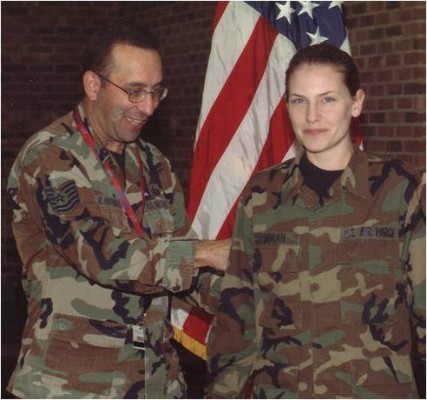As American Airlines Flight 77 approached the Pentagon, it took out power lines and a generator before smashing into the western side of the building. Fifty-three passengers and six crew members were killed in the crash and a section of the Pentagon collapsed from impact.
Senior Airman Rachel Moran, a computer systems operator for the Air Force at the Pentagon, just happened to not be at work that September morning.
“It was a surreal time,” Moran said. “Things at work didn’t really change until the war in 2003 but in other aspects of life everything changed immediately. Everyone was just in shock.”
One week after the attacks, letters containing anthrax were mailed to several news media offices and politicians, killing five and infecting 17. Just one year later, John Allen Mohammed and Lee Boyd Malvo terrorized the Beltway with a spree of sniper shootings.
The series of events heightened the fear and threat of terrorism in the country, and partially led to Moran’s decision to retire in 2004 to spend more time at home with her family.
Before she worked for the Air Force, Moran served in another capacity as a military spouse. She and her husband had decided that they both wanted to serve their country, just not at the same time. The couple spent all of their twenties either enlisted or as a military spouse.
She says that she still has friends that don’t like to speak about 9/11.
“No one wants to admit that they’re forever changed,” Moran said.
Years after her retirement from the Air Force, Moran’s friends and family began encouraging her to take advantage of the 9/11 G.I. Bill and return to school for another degree.
Despite her reservations about returning to college as an adult, Moran decided to enroll at Mason, in pursuit of a bachelors degree in philosophy in 2010. Though the career field and practical application of a philosophy degree is limited, Moran had always been interested in the field, especially in the work of Danish philosopher, Soren Kierkegaard.
On the ten-year anniversary of 9/11, Moran read an article that featured an injured soldier who was returning to school to study philosophy on the G.I. Bill, helping her to understand the importance of her own secondary education.
“They quoted him talking about how important it was for him to return and study something that had personal meaning to him,” Moran said. “It was an act of spiritual healing.”
After a summer fellowship at a Minnesota museum dedicated to the work and life of her favorite philosopher, Moran created a cookbook as a testament to her idea that philosophy can nourish you. The book was inspired by Kierkegaard’s frequent reference to food in his work and features both historical Danish recipes and fun recipes that play on Kierkegaard’s work.
The book, which Moran did not put together with serious intentions, is now being published and has been recognized by the official Kierkegaard museum in Denmark.
“I know that I’m not an academic scholar, and I won’t be a professor,” Moran said. “But because of my work with Kierkegaard, I’m still able to apply myself to the field and be taken seriously as a philosopher.”







Comments